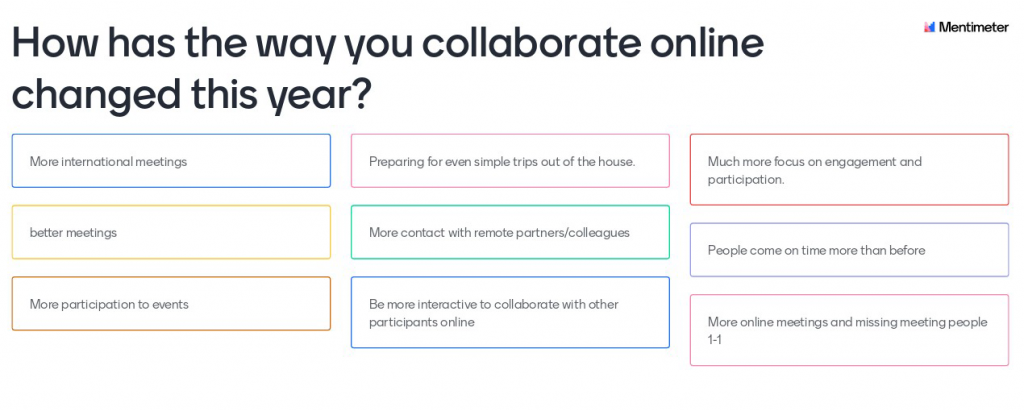Discussions in the recent Foundation-convened e-conference flagged five priority topics essential to effective online dialogue and interaction:
- Enhancing #participation and #engagement
- Nurturing effective #COPs
- Using appropriate #platforms
- #Learning through e-collaboration
- #Sustaining engagement through time
On 24 September, the Dgroups Foundation facilitated an online meeting to discuss whether these are indeed ‘the’ critical issues and ways to capitalize on this emerging agenda. The meeting was part of the knowledge café series put together by the KM4Dev community, and was attended by more than 40 persons, from Kenya to the United States.
Introducing the session, Peter Ballantyne explained the origins of this workshop, starting with a knowledge café in May where participants identifed four critical success factors for online collaboration. This was followed by a session in the KM4Dev@20 workshops in July, where participants extended the agenda (with considerations of the COVID-19 pandemic, a focus on event design and dynamics, calls for cross-community learning and, especially, for greater attention to inclusion), and then with a four-week e-conference where more than 110 practitioners from all over the world looked at ‘what works’ when talking about online collaboration, dialogue and interactions in international development. This session directly resulted from the e-conference where people asked to have a live conversation around the many ideas shared.
An icebreaker exercise asked participants to share ways they collaborate online have changed this year. For some, working from home and working virtually has translated into more frequent and sometimes better managed, more focused meetings. Online collaboration is not a choice and people have become more confident with online tools. On the other hand, working virtually has also meant busier agendas and longer working days. And while it’s easier to collaborate online, participation is not always equal, especially for users that don’t have a good internet connection.

Introducing the initial conclusions and recommendations, e-conference moderator Jorge Chavez-Tafur asked workshop participants to reflect in small groups on these issues, discussing their relevance to their own experiences.
Discussions were deliberately not formally documented; participants instead used the chat to share their recommended ways to enhance online collaboration. Their ideas showed the importance of:
- Mixing formats and channels and tones – formal, informal, conversations, zoom and email for example, online, offline, and knowing when conversation or documentation are best suited
- Learning and innovating and experimenting together, adapting styles to participants and purposes, reinforcing sharing of tacit and explicit knowhow and curating links and resources
- Clarifying and agreeing goals, plans, expectations and purpose, to really be aware of any assumptions – and not be afraid to regularly revisit and adjust priorities and plans
- Devising processes that translate audiences who watch into participants who engage – knowing who is online, making sure they have a chance with the microphone, and actively facilitating interactions
- Making conversations and interactions as inclusive as possible, overcoming connectivity barriers, tackling power dynamics, choosing accessible applications, bringing in all the experiences of participants and giving space for new or different voices.
Reflecting on the actual process of interaction and engagement used for this exercise (3 facilitated Zoom workshops to identify and discuss an agenda, a moderated e-conference to explore insights and lessons more deeply, a wiki to capture and organize insights, blog posts and video reports of the discussions, synthesis and summary products … ) participants formed groups again to share how they felt about the various engagement elements. Some of the ‘success’ insights seen or heard by participants included:
- Actively inviting and encouraging people to take part; engaging people behind the scenes as the facilitator and reaching out individually to encourage and appreciate their participation
- Having a dialogue that was well-organized, structured and focused, time-bound and a sense that it is brought together for a purpose/outcome
- Considering the importance of trust – which can be reinforced through interactions and getting to know and appreciate others
- Building horizontal interactions and networking; getting to meet people, find people and share in their knowledge – all needing good leadership
- Encouraging people to take part by mapping their knowledge, providing conversational spaces, fishbowl type meetings and video interviews; Zoom calls can build trust between people and email/wiki provides the space for analysis and thinking.
Looking forward, we closed the discussions by brainstorming what some concrete ways to capitalize on these insights and learning could be:
- Document how the online discussions were organized so the approach can be adapted by others
- Document and share the notes and recordings of the discussions
- Map the impact of CoPs, particularly KM4Dev
- Organize specific ‘peer assists’ on some challenging online situations (e.g., my annual conference is virtual; my learning event is online; my writeshop is digital; how do I document an online event …) where collective experiences can be shared and documented – as an extension of the KS Toolkit for example
- Keep having these conversations – not everything needs to be documented – there is value in just sharing
- Use the wiki to summarize conversation; encourage participants to contribute to this.
- Devise a capitalization process: make a pool for ideas, call for participation, link them at the back end, match them with a good facilitator…
These ideas will be fed back into the e-conference where they will feed development of a short synthesis product and help continue and sustain the engagement through the various networks and emerging collaborations.
Report compiled by Peter Ballantyne, Jorge Chavez-Tafur and Pier Andrea Pirani